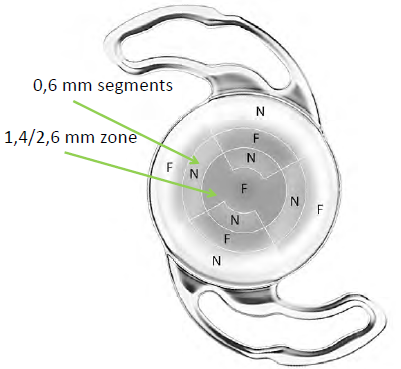Cataract, Refractive
New Multi-Segmented Multifocal IOL Results
Alternating segments generate a wide range of foci with minimal glare and halos.

Howard Larkin
Published: Wednesday, August 31, 2022
A multi-segmented diffractive intraocular lens (IOL) produced very good visual acuity at all distances from far to near six months after implantation for cataract or clear lens exchange patients. The Precizon IOL (Ophtec, Netherlands) also did not produce bothersome glare or halos in most patients, reports Mike P Holzer MD, FEBO.
Unlike conventional multifocal IOLs that use concentric power rings, the Precizon IOL’s 11 overlapping segments, 6 for near and 5 for far, create a continuous transitional focus, Dr Holzer explained. In addition to reducing photic phenomena, it produces a wide range of vision that is not pupil size dependent and should be decentration resistant.i
In a prospective, multicentre, open-label study involving 118 eyes of 59 patients, of whom 90% had cataracts before surgery, mean uncorrected binocular distance visual acuity was -0.0043 logMAR, and uncorrected near VA 0.1954 six months after surgery. Mean uncorrected binocular intermediate VA was 0.1429 logMAR three months after surgery, Dr Holzer reported.
Looking at refractive outcomes six months after surgery, mean monocular spherical equivalent was 0.29±0.45 D ranging from -0.50 D to 1.50 D; mean cylinder -0.29±0.39 D ranging from -1.25 D to 0.00 D; and mean spherical equivalent 0.14±0.39 D. Achieved spherical equivalent was within 0.5 D of target for 84% of patients. A slight hyperopic shift led the surgeons to optimise the lens A-constant, Dr Holzer said.
WIDE DEFOCUS CURVE
The usable defocus curve was also wide, with mean binocular best corrected visual acuity -0.04 logMAR at distance, 0.15 logMAR at 1.5 D defocus, and 0.27 logMAR at -3.0 D defocus. All lenses implanted were non-toric. Preoperative mean cylinder was -0.66 D.
Patient-reported quality of vision also was good, Dr Holzer said. For glare, 90% of patients said they never or occasionally experienced it, and 86% said it was never or occasionally bothersome. For halos, 78% said they never or occasionally experienced them, and 84% said the halos were never or occasionally bothersome.
“All surgeries and postoperative outcomes were uneventful. The multi-segmented IOL provided good visual acuities at all distances from near to far, and the patient questionnaire revealed a good quality of vision,” Dr Holzer concluded.
i Clinical Opthalmology. 2021; 15: 2117–2126.
This research was presented at the 2022 ASCRS Annual Meeting in Washington, DC, US.
Mike P Holzer MD, FEBO owns and operates Augenzentrum Prof Dr Holzer & Prof Dr Rabsilber in Weinheim and Mannheim, Germany, and is an adjunct professor at the Ruprecht-Karls-University Heidelberg, Germany. info@augenzentrum-holzer.de

Latest Articles
Towards a Unified IOL Classification
The new IOL functional classification needs a strong and unified effort from surgeons, societies, and industry.
The 5 Ws of Post-Presbyopic IOL Enhancement
Fine-tuning refractive outcomes to meet patient expectations.
AI Shows Promise for Meibography Grading
Study demonstrates accuracy in detecting abnormalities and subtle changes in meibomian glands.
Are There Differences Between Male and Female Eyes?
TOGA Session panel underlined the need for more studies on gender differences.
Simulating Laser Vision Correction Outcomes
Individualised planning models could reduce ectasia risk and improve outcomes.
Need to Know: Aberrations, Aberrometry, and Aberropia
Understanding the nomenclature and techniques.
When Is It Time to Remove a Phakic IOL?
Close monitoring of endothelial cell loss in phakic IOL patients and timely explantation may avoid surgical complications.
Delivering Uncompromising Cataract Care
Expert panel considers tips and tricks for cataracts and compromised corneas.
Organising for Success
Professional and personal goals drive practice ownership and operational choices.